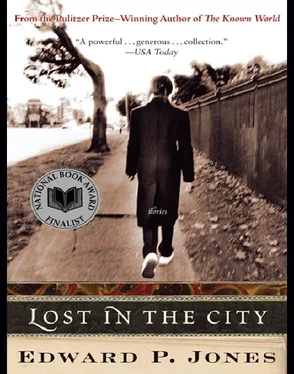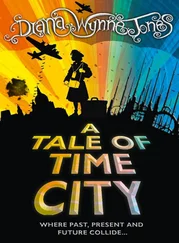He drank without enjoyment and listened to the chirping, unsettling, demanding. He would not wake his daughter just to let her know about the hatchlings. Two little monsters had changed the predictable world he was trying to create for his child and he was suddenly afraid for her. He turned on the radio and played it real low, but he soon shut it off, because the man on WOOK was telling him to go in and kill the hatchlings.
It turned out that the first pigeon to die was a stranger, and Robert never knew anything about it. The bird appeared out of nowhere and was dead less than a week later. By then, a year or so after Miles gave her the yearlings, she had eight birds of various ages, resulting from hatches in her coop and from trades with the barber (“for variety’s sake,” he told her) and with a family in Anacostia. One morning before going to school, she noticed the stranger perched in one of the lower cubicles, a few inches up from the floor, and though he seemed submissive enough, she sensed that he would peck with all he had if she tried to move him out. His entire body, what little there was left of it, was a witness to misery. One ragged cream-colored tail feather stuck straight up, as if with resignation. His bill was pitted as if it had been sprayed with minute pellets, and his left eye was covered with a patch of dried blood and dirt and decaying flesh.
She placed additional straw to either side of him in the cubicle and small bowls of water and feed in front of the cubicle. Then she began to worry that he had brought in some disease that would ultimately devastate her flock.
Days later, home for lunch with Ralph, she found the pigeon dead near the water tray, his wings spread out full as if he had been preparing for flight.
“Whatcha gonna do with him?” Ralph asked, kneeling down beside Betsy Ann and poking the dead bird with a pencil.
“Bury him. What else, stupid?” She snatched the pencil from him. “You don’t think any a them gonna do it, do you?” and she pointed to the few stay-at-home pigeons who were not out flying about the city. The birds looked down uninterestedly at them from various places around the coop. She dumped the dead bird in a pillowcase and took it across 1st Street to the grassy spot of ground near the Esso filling station in front of the medieval wall. With a large tablespoon, she dug two feet or so into the earth and dropped the sack in.
“Beaver would say something over his grave,” Ralph said.
“What?”
“Beaver. The boy on TV.”
She gave him a cut-eye look and stood up. “You do it, preacher man,” she said. “I gotta get back to school.”
After school she said to Miss Jenny, “Don’t tell Daddy bout that dead pigeon. You know how he is: He’ll think it’s the end of the world or somethin.”
The two were in Miss Jenny’s kitchen, and Miss Jenny was preparing supper while Betsy Ann did her homework.
“You know what he do in the mornin?” Betsy Ann said. “He go out and look at them pigeons.”
“Oh?” Miss Jenny, who knew what Robert had been doing, did not turn around from the stove. “Wants to say good mornin to em, hunh?”
“I don’t think so. I ain’t figured out what he doin,” the girl said. She was sitting at Miss Jenny’s kitchen table. The dog, Bosco, was beside her and one of her shoes was off and her foot was rubbing the dog’s back. “I was sleepin one time and this cold air hit me and I woke up. I couldn’t get back to sleep cause I was cold, so I got up to see what window was open. Daddy wasn’t in the bed and he wasn’t in the kitchen or the bathroom. I thought he was downstairs warmin up the cab or somethin, but when I went to close the kitchen window, I could see him, peekin in the coop from the side with a flashlight. He scared me cause I didn’t know who he was at first.”
“You ask him what he was doin?”
“No. He wouldn’t told me anyway, Miss Jenny. I just went back to my room and closed the door. If I’da asked him straight out, he would just make up something or say maybe I was dreamin. So now when I feel that cold air, I just look out to see if he in bed and then I shut my door.”
Sometimes, when the weather allowed, the girl would sit on the roof plaiting her hair or reading the funny papers before school, or sit doing her homework in the late afternoon before going down to Miss Jenny’s or out to play. She got pleasure just from the mere presence of the pigeons, a pleasure that was akin to what she felt when she followed her Aunt Thelma about her house, or when she jumped double dutch for so long she had to drop to the ground to catch her breath. In the morning, the new sun rising higher, she would place her chair at the roof’s edge. She could look down at tail-wagging Bosco looking up at her, down through the thick rope fence around the roof that Robert had put up when she was a year old. She would hum or sing some nonsense song she’d made up, as the birds strutted and pecked and preened and flapped about in the bath water. And in the evening she watched the pigeons return home, first landing in the oak tree, then over to the coop’s landing board. A few of them, generally the males, would settle on her book or on her head and shoulders. Stroking the breast of one, she would be rewarded with a cooing that was as pleasurable as music, and when the bird edged nearer so that it was less than an inch away, she smelled what seemed a mixture of dirt and rainy air and heard a heart that seemed to be hurling itself against the wall of the bird’s breast.
She turned ten. She turned eleven.
In the early summer of 1960, there began a rumor among the children of Betsy Ann’s age that the railroad people were planning to take all the land around Myrtle Street, perhaps up to L Street and down to H Street. This rumor — unlike the summer rumor among Washington’s Negro children that Richard Nixon, if he were elected president, would make all the children go to school on Saturday from nine to twelve and cut their summer vacations in half — this rumor had a long life. And as the boys scraped their knuckles on the ground playing Poison, as the girls jumped rope until their bouncing plaits came loose, as the boys filled the neighborhood with the sounds of amateur hammering as they built skating trucks, as the girls made up talk for dolls with names they would one day bestow on their children, their conversations were flavored with lighthearted speculation about how far the railroad would go. When one child fell out with another, it became standard to try to hurt the other with the “true fact” that the railroad was going to take his or her home. “It’s a true fact, they called my daddy at his work and told him we could stay, but yall gotta go. Yall gotta.” And then the tormentor would stick out his or her tongue as far as it would go.
There were only two other girls on Myrtle Street who were comfortable around pigeons, and both of them moved away within a month of each other. One, LaDeidre Gordon, was a cousin of the brothers Carlos and Carleton. LaDeidre believed that the pigeons spoke a secret language among themselves, and that if she listened long enough and hard enough she could understand what they were saying and, ultimately, could communicate with them. For this, the world lovingly nicknamed her “Coo-Coo.” After LaDeidre and the second girl moved, Betsy Ann would take the long way around to avoid passing where they had lived. And in those weeks she found a comfort of sorts at Thelma and Ralph’s, for their house and everything else on the other side of North Capitol Street, the rumor went, would be spared by the railroad people.
Thelma Holley, her husband, and Ralph lived in a small house on L Street, Northwest, two doors from Mt. Airy Baptist Church, just across North Capitol Street. Thelma had suffered six miscarriages before God, as she put it, “took pity on my womb” and she had Ralph. But even then, she felt God had given with one hand and taken with the other, for the boy suffered with asthma. Thelma had waited until the seventh month of her pregnancy before she felt secure enough to begin loving him. And from then on, having given her heart, she thought nothing of giving him the world after he was born.
Читать дальше












